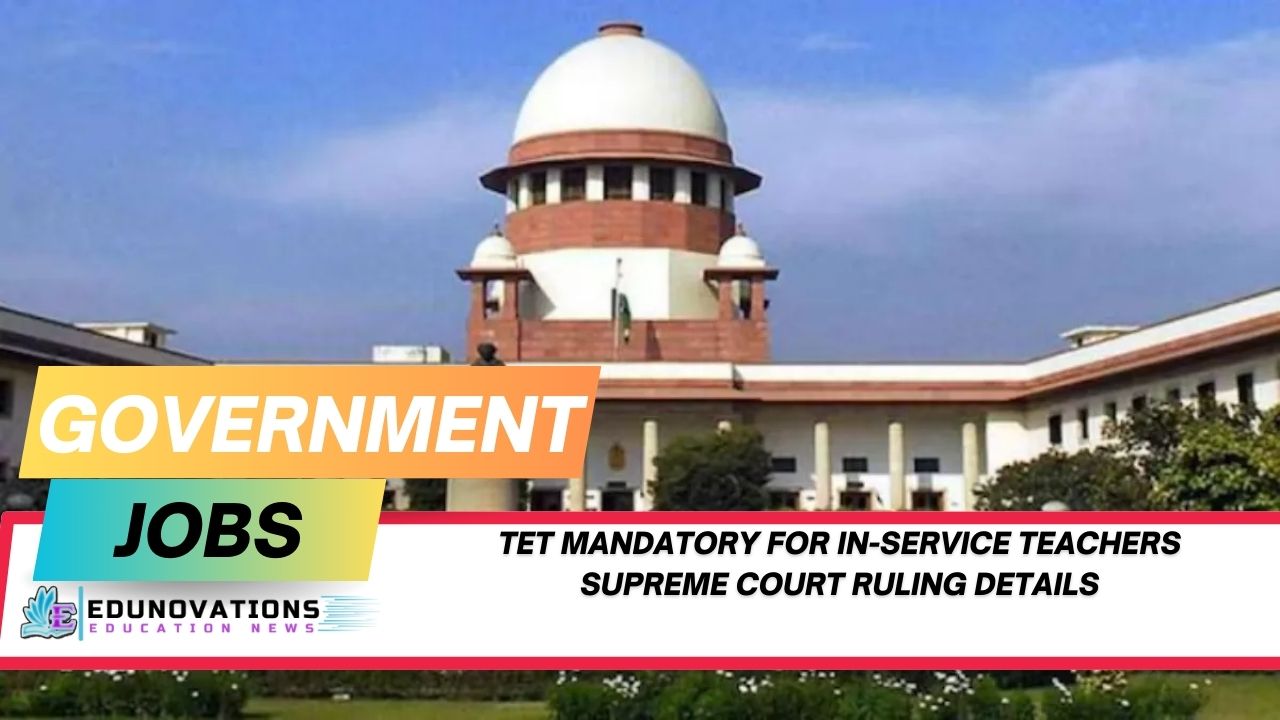Supreme Court declares TET mandatory for in-service teachers, setting deadlines, exemptions, and rules for promotions. Full ruling explained here.
Introduction
In a landmark judgment that reshapes the education landscape in India, the Supreme Court has ruled that the Teachers’ Eligibility Test (TET) is mandatory for in-service teachers, setting strict guidelines for appointments, promotions, and service continuation. The ruling, hailed as a step toward strengthening teacher quality, provides clarity on exemptions, grace periods, and applicability in different types of schools. For teachers, education policymakers, and institutions, these Supreme Court ruling details hold far-reaching implications.
The decision directly affects lakhs of school teachers across the country who were either appointed before the enactment of the Right to Education (RTE) Act or those aspiring for promotions. It has also sparked conversations on balancing teacher qualifications with ground realities such as retirement timelines and minority institution rights.
Why the Supreme Court Stepped In
The Supreme Court’s intervention followed petitions questioning whether teachers already in service should be required to clear the TET. The apex court clarified that while education quality is paramount, fairness must be maintained for teachers nearing retirement or those working under special institutional frameworks.
The ruling mandates that all teachers with more than five years of service left must clear TET within two years. Those with less than five years before retirement are exempted, but their promotional avenues are restricted unless they pass the exam. This nuanced stance reflects the Court’s effort to strike a balance between reform and practicality.
Key Highlights of the Ruling
- TET compulsory for service continuation: Teachers appointed under the RTE framework must pass TET to remain in service.
- Two-year deadline: In-service teachers have two years to clear the exam.
- Retirement-based exemption: Teachers with fewer than five years left before retirement do not need to pass TET but cannot claim promotions without it.
- Minority institutions: The applicability of TET in minority schools is postponed until a larger constitutional bench examines the issue.
- Promotion criteria: Teachers must pass TET to qualify for career advancements, ensuring merit-based promotions.
Implications for Teachers Across India
The ruling affects thousands of educators who entered the profession before the RTE Act made TET a statutory requirement. Teachers in rural and semi-urban schools, particularly those nearing retirement, are relieved by the exemption. However, younger in-service teachers now face the pressure of balancing their teaching duties with TET preparation.
For aspirants, the judgment reaffirms that clearing TET is a non-negotiable qualification for appointments. This clarity is expected to encourage states to streamline their teacher recruitment policies.
Toppers Use Mind Maps to score more than 95%
NCERT Class 11th Commerce Mind Maps
Add to cartOriginal price was: ₹999.00.₹199.00Current price is: ₹199.00.NCERT Class 12th Chemistry Mind Maps
Add to cartOriginal price was: ₹199.00.₹75.00Current price is: ₹75.00.NCERT Class 12th Commerce Mind Maps
Add to cartOriginal price was: ₹999.00.₹199.00Current price is: ₹199.00.NCERT Class 12th Science Mind Maps
Add to cartOriginal price was: ₹999.00.₹199.00Current price is: ₹199.00.NCERT Mind Maps For Class 10th
Add to cartOriginal price was: ₹999.00.₹199.00Current price is: ₹199.00.
Purchase Today
Expert Reactions
Renowned education policy expert Anil Swarup, former Secretary of the Ministry of Human Resource Development, welcomed the ruling, stating:
“The Supreme Court’s directive will elevate the teaching standards across India. While it is important to protect the interests of senior teachers nearing retirement, ensuring that new and mid-career teachers meet national benchmarks is essential for long-term quality.”
Teacher associations, however, voiced concerns about the two-year deadline. According to the All India Teachers Federation, many rural educators lack access to training resources and will require government support to meet this requirement.
Broader Policy Context
The judgment links closely with the goals of the Right to Education Act, which emphasizes qualified teachers as the cornerstone of effective schooling. It also resonates with the National Education Policy 2020, which envisions transforming the quality of education delivery in India.
Statistics from the Ministry of Education reveal that nearly 20% of teachers in government schools currently do not meet the qualification norms mandated by the RTE Act. Making TET compulsory is expected to bridge this gap.
Challenges Teachers May Face
- Time Pressure: Balancing teaching responsibilities with TET preparation.
- Resource Availability: Lack of access to quality study material in remote areas.
- Digital Divide: Online TET preparation platforms may exclude teachers in rural regions.
- Policy Uncertainty for Minority Institutions: Teachers in minority schools remain uncertain about future requirements.
Teachers can make use of free and structured preparation resources such as:
Implications for Schools and Administrators
School managements must now ensure compliance with the Supreme Court’s directives. This means restructuring their hiring and promotion policies while providing professional development support. For private and government schools alike, upgrading teacher quality becomes a compliance and reputational issue.
Administrators looking for digital solutions to track teacher qualifications and streamline communication may benefit from services like Mart India Infotech, which specializes in educational technology support for schools.
How Teachers Can Prepare
- Structured Study Plans: Using NCERT Mind Maps for quick revision.
- Current Affairs Integration: Staying updated with Current Affairs for teaching pedagogy.
- Syllabus Familiarity: Reviewing official syllabus to focus on core areas.
- Mock Tests: Practicing with online resources to gauge readiness.
Future Outlook
The Supreme Court ruling is more than a legal directive—it is a push toward professionalizing teaching standards in India. By mandating TET, the judiciary has reinforced the message that education reforms require qualified, accountable, and competent teachers.
The debate, however, will continue. Questions remain on how effectively state governments will support teachers during this transition and whether exemptions for minority schools will remain temporary or permanent.
FAQs
Q1. What are the TET mandatory for in-service teachers Supreme Court ruling details?
The Supreme Court ruled that all in-service teachers must clear TET within two years to remain in service, with exemptions for those retiring within five years.
Q2. Are teachers nearing retirement required to clear TET?
No, those with less than five years of service left are exempt, though they cannot claim promotions without TET.
Q3. What is the two-year deadline for in-service teachers?
Teachers must pass TET within two years of the ruling to retain their jobs.
Q4. Do minority institutions have to follow the TET rule?
Currently, minority schools are exempt until a larger Supreme Court bench issues a final decision.
Q5. Is TET required for teacher promotions?
Yes, promotions are contingent on passing TET, regardless of years of service left.
Q6. How does the ruling affect teachers appointed before the RTE Act?
They are required to clear TET within the stipulated time unless nearing retirement.
Q7. What resources are available for TET preparation?
Teachers can use NCERT courses, study notes, MCQs, and video lessons from Edunovations.
Q8. How does this ruling align with NEP 2020?
It aligns with NEP’s emphasis on professional standards and qualified teachers.
Q9. Will exemptions for minority institutions be permanent?
No, they are temporary until a larger constitutional bench delivers clarity.
Q10. Why is TET significant for Indian education?
It standardizes teacher quality, ensuring every student has access to qualified educators.














